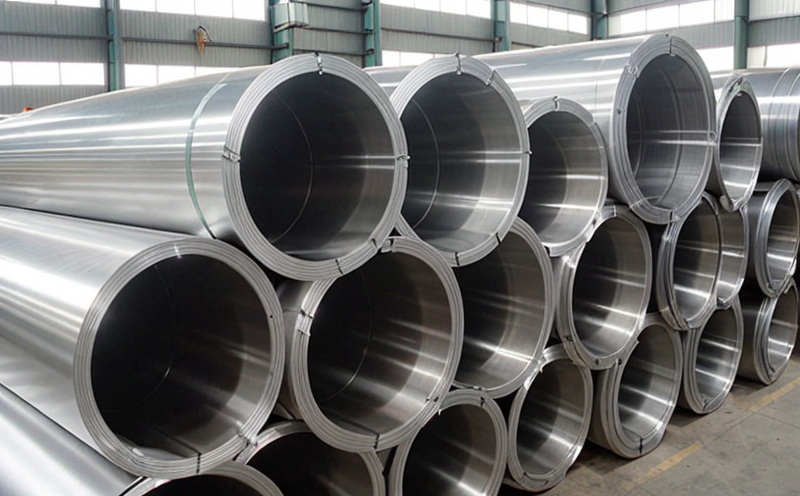ASTM G85 Marine Cyclic Fog Testing of Stainless Alloys
The ASTM G85 standard provides a method for determining the resistance of stainless alloys to marine cyclic fog corrosion. This test is essential in ensuring that materials used in maritime environments, especially those exposed to salt-laden atmospheres, meet the required durability and performance standards.
Marine environments are notorious for their corrosive nature due to the presence of salt spray, humidity, and other environmental factors. These conditions can significantly impact the longevity and reliability of materials used in ship equipment and infrastructure. ASTM G85 addresses this challenge by simulating real-world marine fog exposure through cyclic testing.
The test involves exposing stainless alloy samples to a series of temperature and relative humidity cycles that mimic the environmental conditions found in coastal areas. This process helps determine the material's ability to withstand prolonged exposure without degradation. The test setup includes controlled environmental chambers capable of maintaining precise temperature and humidity levels, ensuring accurate and consistent results.
Proper specimen preparation is critical for ASTM G85 testing. Specimens must be cleaned thoroughly to remove any surface contaminants or residues that could affect the test outcome. After cleaning, specimens are carefully cut into standard dimensions suitable for cyclic fog exposure. Once prepared, they undergo a stabilization treatment if required by the specific alloy being tested.
The testing procedure follows a predefined cycle of temperature and humidity conditions. Typically, this involves cycling between dry and humid phases to simulate the transition from clear skies to foggy conditions. The duration of each phase can vary based on the specific requirements of the test, but it usually ranges from several hours to days. During these cycles, specimens are exposed to controlled levels of salt spray, which simulates marine fog.
After completing all prescribed cycles, the specimens are visually inspected for signs of corrosion. Any changes in appearance or structural integrity can indicate potential issues with the tested material. Detailed reports are generated based on these observations, providing insights into the material's performance under simulated marine fog conditions. These reports serve as valuable tools for quality managers and compliance officers to ensure that selected materials meet stringent industry standards.
ASTM G85 testing is particularly beneficial in industries where equipment and infrastructure are frequently exposed to harsh coastal environments. By leveraging this standardized method, manufacturers can optimize their product designs and select the most appropriate materials, thereby enhancing overall performance and reliability.
The results of ASTM G85 tests provide critical information for quality managers, compliance officers, R&D engineers, and procurement teams responsible for selecting suitable materials for marine applications. These insights help in making informed decisions that align with project specifications and regulatory requirements.
Benefits
The ASTM G85 testing process offers numerous advantages to industries operating within marine environments:
- Enhanced Durability: Ensures prolonged service life of materials in harsh coastal conditions.
- Improved Reliability: Provides consistent and reliable performance data for material selection.
- Regulatory Compliance: Meets international standards, ensuring compliance with maritime regulations.
- Risk Reduction: Minimizes the risk of equipment failure due to corrosion in marine environments.
The precise control over environmental conditions during testing ensures accurate and repeatable results. This is crucial for industries where even minor variations can have significant implications on product performance and safety.
By leveraging ASTM G85 testing, manufacturers can confidently choose materials that not only meet but exceed the required standards, ultimately leading to more robust and reliable products in marine applications.
Environmental and Sustainability Contributions
- Emissions Reduction: By ensuring better material performance, less frequent replacement is needed, reducing overall emissions.
- Resource Efficiency: Optimized materials enhance the efficiency of marine equipment, leading to lower resource consumption.
- Energy Savings: More durable components require fewer replacements, contributing to reduced energy usage over their lifespan.
The ASTM G85 testing process plays a crucial role in promoting sustainable practices within the marine industry. By selecting materials that withstand harsh environmental conditions effectively, manufacturers can minimize waste and reduce the overall environmental footprint of their products.
Through rigorous testing and validation, ASTM G85 helps drive innovation towards more sustainable solutions, ensuring that industries operate responsibly while meeting stringent performance criteria.
Use Cases and Application Examples
| Application | Description |
|---|---|
| Fogging Systems for Ships | Testing the durability of components in fogging systems to ensure they function effectively under marine conditions. |
| Marine Pipelines and Valves | Evaluating materials used in pipelines and valves to withstand salt-laden atmospheres without degradation. |
| Yachts and Pleasure Craft | Determining the suitability of materials for yachts exposed to coastal environments. |
| Offshore Structures | Assessing structural components used in offshore installations for their resistance to marine fog corrosion. |
| Tugboats and Pilots | Ensuring the reliability of equipment critical to tugboat operations, including foghorns and communication systems. |
The ASTM G85 testing process is widely used across various sectors within marine applications. It ensures that materials meet the stringent requirements needed for long-term performance in harsh coastal environments. The results of these tests are invaluable for quality managers, compliance officers, and R&D engineers working on projects involving maritime infrastructure.





